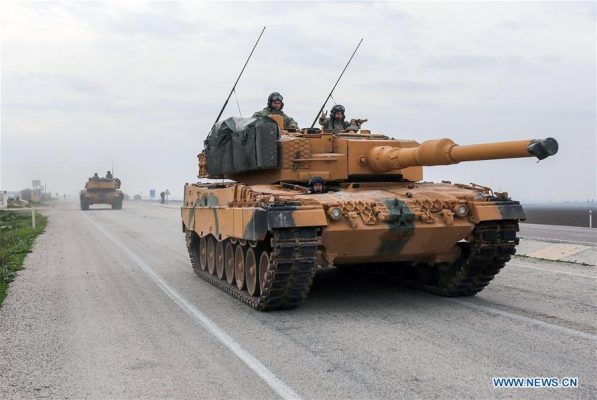
ANKARA — A phone conversation between Turkish and the US presidents on Wednesday about Syria has sparked controversy as Erdogan denies Trump’s remarks over Turkish incursion in Kurdish enclave Afrin of Syria.
The US and Turkey have released contradicting readouts of the phone call between US President Donald Trump and Turkish President Recep Tayyip Erdogan, revealing again the deepened disagreements between the two NATO allies on the issue of Syria.
Two leaders exchanged views on the “Operation Olive Branch” launched by Turkey on Jan 20, a written statement by the Turkish presidency said.
The phone conversation focused on the importance of bilateral cooperation in fighting terrorism, the Turkey’s statement said noting that Erdogan stated the goal of the military incursion was to clear Afrin off “terrorist elements” for Turkey’s national security.
A White House readout about the phone conversation between two leaders came after the Turkish one.
Trump “relayed concerns that escalating violence in Afrin, Syria, risks undercutting our shared goals in Syria. He urged Turkey to deescalate, limit its military actions, and avoid civilian casualties and increase in the number of displaced persons and refugees,” according to the White House press release.
Trump also “urged Turkey to exercise caution and to avoid any actions that might risk conflict between Turkish and American forces,” it said in an indirect reference to Turkey’s plans to extend its military operation into Manbij region in Syria where the US soldiers are deployed.
He “reiterated that both nations must focus all parties on the shared goal of achieving the lasting defeat of ISIS,” and “invited closer bilateral cooperation to address Turkey’s legitimate security concerns,” said the statement.
Trump expressed “concern about the destructive and false anti-American rhetoric emanating from Turkey, and about United States citizens and local employees detained under the prolonged State of Emergency in Turkey.”
However, in midnight late Wednesday, an anonymous Turkish official refuted context of the White House readout on Turkey’s media.ANKARA — A phone conversation between Turkish and the US presidents on Wednesday about Syria has sparked controversy as Erdogan denies Trump’s remarks over Turkish incursion in Kurdish enclave Afrin of Syria.
The US and Turkey have released contradicting readouts of the phone call between US President Donald Trump and Turkish President Recep Tayyip Erdogan, revealing again the deepened disagreements between the two NATO allies on the issue of Syria.
Two leaders exchanged views on the “Operation Olive Branch” launched by Turkey on Jan 20, a written statement by the Turkish presidency said.
The phone conversation focused on the importance of bilateral cooperation in fighting terrorism, the Turkey’s statement said noting that Erdogan stated the goal of the military incursion was to clear Afrin off “terrorist elements” for Turkey’s national security.
A White House readout about the phone conversation between two leaders came after the Turkish one.
Trump “relayed concerns that escalating violence in Afrin, Syria, risks undercutting our shared goals in Syria. He urged Turkey to deescalate, limit its military actions, and avoid civilian casualties and increase in the number of displaced persons and refugees,” according to the White House press release.
Trump also “urged Turkey to exercise caution and to avoid any actions that might risk conflict between Turkish and American forces,” it said in an indirect reference to Turkey’s plans to extend its military operation into Manbij region in Syria where the US soldiers are deployed.
He “reiterated that both nations must focus all parties on the shared goal of achieving the lasting defeat of ISIS,” and “invited closer bilateral cooperation to address Turkey’s legitimate security concerns,” said the statement.
Trump expressed “concern about the destructive and false anti-American rhetoric emanating from Turkey, and about United States citizens and local employees detained under the prolonged State of Emergency in Turkey.”
However, in midnight late Wednesday, an anonymous Turkish official refuted context of the White House readout on Turkey’s media.
The Turkish official said the White House statement did not “accurately reflect the content of” the phone conversation.
“President Trump did not share any concerns about escalating violence with regard to the ongoing military operation in Afrin. The two leaders’ discussion of ‘Operation Olive Branch’ was limited to an exchange of views,” state-run Anadolu Agency quoted the Turkish official as saying.
During the conversation, Trump discussed “restricting the operation in Afrin to a certain time limit and avoiding any close combat in Manbij, due to the presence of US soldiers in the region,” the official said.
Erdogan, for his part, recalled a previous promise that the YPG/PYD (Democratic Union Party) elements will withdraw to the east of Euphrates River, if that happened the Turkish-supported Free Syrian Army will fill the vacuum, according to the official.
The Turkish official also said that Trump did not use the words “destructive and false rhetoric coming from Turkey.”
“In response to President Erdogan’s call on the US for ending the delivery of weapons to the PYD/YPG, President Trump said that his country no longer supplied the group with weapons and pledged not to resume the weapons delivery in the future,” the Turkish official added.
The official also said that there was no discussion of the ongoing state of emergency in Turkey, but Trump mentioned the US citizens and local personnel currently under arrest.
“President Erdogan responded to Mr Trump’s request by noting that there was the rule of law in Turkey and highlighted that the independent judiciary would reach its verdict following the completion of relevant indictments,” the official said.
The phone call came after Turkish forces, accompanied with the Free Syrian Army fighters, launched a military operation into Afrin against the YPG which Turkey deems as the Syrian branch of outlawed Kurdistan Workers’ Party (PKK).
The military incursion into Kurdish enclave started few days after the US announced that they train Syrian Kurds in order to form a border security force. Turkey strongly reacted against the plan and escalated its anti-American rhetoric in terms of “US support to terrorists.”
Tension between two NATO allies escalated after the US stepped up to form a 30,000-strong border force, including the YPG, to patrol Syria’s frontiers. The move further deepened Turkey’s mistrust towards the US as Ankara said it constitutes an intolerable national security threat and accused Washington of establishing an “army of terrorists.”
Ankara further threatened to extend its “Operation olive Branch” to Manbij region, where the Kurdish militia were deployed after fighting with the Islamic State (IS) group in the region with arms support and air cover by the US
The YPG did not retreat to the east of Euphrates River after defeating the IS despite that Turkey was putting pressure on the US As Pentagon keeps troops in Manbij region, the US is worried about any confrontation with Turkish army.
In a move to ease tension with Turkey, the US Secretary of State Rex Tillerson said on Monday that the US recognizes Ankara’s “legitimate right” to defend itself from terrorists, suggesting that a security zone could help stabilize the situation and meet Turkey’s security concerns.
Elaborating on his meeting with Tillerson on Tuesday, Turkish Foreign Minister Mevlut Cavusoglu said his American counterpart raised the possibility of a 30-kilometre deep “safe zone” along Turkey’s border with Syria.
Yet, Ankara is cautious with such a plan as the minister said Turkey and the US may have different “understandings and expectations” as to what a safe zone would entail.
“Trust with the US has been damaged. Until trust between the two countries has been re-established, it would not be appropriate to discuss such issues,” Cavusoglu said on Thursday, and “we need to fix this skeptical environment at first.”


